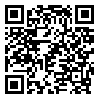Mon, Feb 2, 2026
Volume 11, Issue 1 (Winter 2025)
Caspian J Neurol Sci 2025, 11(1): 77-86 |
Back to browse issues page
Ethics code: IR.GUMS.REC.1399.508
Download citation:
BibTeX | RIS | EndNote | Medlars | ProCite | Reference Manager | RefWorks
Send citation to:



BibTeX | RIS | EndNote | Medlars | ProCite | Reference Manager | RefWorks
Send citation to:
Hosseininezhad M, Saadat S, Younesi Rostami F, Zare R, Bonyad A, Qanbary Joopish M, et al . The Feasibility of Telephone-delivered Self-management Intervention in Multiple Sclerosis. Caspian J Neurol Sci 2025; 11 (1) :77-86
URL: http://cjns.gums.ac.ir/article-1-765-en.html
URL: http://cjns.gums.ac.ir/article-1-765-en.html
Mozaffar Hosseininezhad1 

 , Sajjad Saadat2
, Sajjad Saadat2 

 , Fatemeh Younesi Rostami1
, Fatemeh Younesi Rostami1 

 , Roghaye Zare3
, Roghaye Zare3 

 , Ali Bonyad4
, Ali Bonyad4 

 , Masoumeh Qanbary Joopish5
, Masoumeh Qanbary Joopish5 

 , Alia Saberi *6
, Alia Saberi *6 

 , Fateme Shafaee2
, Fateme Shafaee2 




 , Sajjad Saadat2
, Sajjad Saadat2 

 , Fatemeh Younesi Rostami1
, Fatemeh Younesi Rostami1 

 , Roghaye Zare3
, Roghaye Zare3 

 , Ali Bonyad4
, Ali Bonyad4 

 , Masoumeh Qanbary Joopish5
, Masoumeh Qanbary Joopish5 

 , Alia Saberi *6
, Alia Saberi *6 

 , Fateme Shafaee2
, Fateme Shafaee2 


1- Neuroscience Research Center, School of Medicine, Poursina Hospital, Guilan University of Medical Sciences, Guilan, Iran.
2- Neuroscience Research Center, Guilan University of Medical Sciences, Rasht, Iran.
3- Neuroscience Research Center, Trauma Institute, Poursina Hospital, Guilan University of Medical Sciences, Rasht, Iran.
4- Faculty of Medicine, Guilan University of Medical Science, Rasht, Iran.
5- Department of Psychology, Tonekabon Branch, Islamic Azad University, Tonekabon, Iran.
6- Neuroscience Research Center, School of Medicine, Poursina Hospital, Guilan University of Medical Sciences, Guilan, Iran. ,Alia.saberi1@gmail.com
2- Neuroscience Research Center, Guilan University of Medical Sciences, Rasht, Iran.
3- Neuroscience Research Center, Trauma Institute, Poursina Hospital, Guilan University of Medical Sciences, Rasht, Iran.
4- Faculty of Medicine, Guilan University of Medical Science, Rasht, Iran.
5- Department of Psychology, Tonekabon Branch, Islamic Azad University, Tonekabon, Iran.
6- Neuroscience Research Center, School of Medicine, Poursina Hospital, Guilan University of Medical Sciences, Guilan, Iran. ,
Abstract: (900 Views)
Background: Self-management plays a significant role in people’s active participation in treating multiple sclerosis (MS), improving quality of life, suppressing symptoms, and reducing treatment costs. People with MS face many physical, mental and emotional challenges that negatively affect their quality of life.
Objectives: This study aims to determine the feasibility of telephone-delivered self-management intervention in people with MS.
Materials & Methods: This quasi-experimental study employed a pretest-posttest and a two-month follow-up design. A total of 20 MS patients registered in the nationwide MS registry of Iran (NMSRI), Guilan, in 2020 took part in this study. The participants were selected through a public callback using judgmental sampling. The telephone-delivered self-management intervention, delivered through educational video files and telephone calls, included evidence-based cognitive behavioral therapy and psychological strategies to assist participants. The intervention was delivered in 8 weekly sessions. The MS self-management scale–revised (MSSM-R) and the short-form health survey (SF-36) were used to collect study data.
Results: The participants had a disproportionate distribution in gender, marital status, place of residence, employment status, and income. The intervention affects the self-management total score (P<0.001), the treatment adherence/barriers subscale (P=0.024), the MS knowledge and information subscale (P<0.001), and health maintenance behavior (P=0.004). It also influenced the quality-of-life total score (P=0.049) and mental health domain (P=0.018).
Conclusion: Telephone-delivered self-management intervention in patients with MS has positive effects in many of the investigated areas, and this intervention can be used to improve the quality of life of these patients.
Objectives: This study aims to determine the feasibility of telephone-delivered self-management intervention in people with MS.
Materials & Methods: This quasi-experimental study employed a pretest-posttest and a two-month follow-up design. A total of 20 MS patients registered in the nationwide MS registry of Iran (NMSRI), Guilan, in 2020 took part in this study. The participants were selected through a public callback using judgmental sampling. The telephone-delivered self-management intervention, delivered through educational video files and telephone calls, included evidence-based cognitive behavioral therapy and psychological strategies to assist participants. The intervention was delivered in 8 weekly sessions. The MS self-management scale–revised (MSSM-R) and the short-form health survey (SF-36) were used to collect study data.
Results: The participants had a disproportionate distribution in gender, marital status, place of residence, employment status, and income. The intervention affects the self-management total score (P<0.001), the treatment adherence/barriers subscale (P=0.024), the MS knowledge and information subscale (P<0.001), and health maintenance behavior (P=0.004). It also influenced the quality-of-life total score (P=0.049) and mental health domain (P=0.018).
Conclusion: Telephone-delivered self-management intervention in patients with MS has positive effects in many of the investigated areas, and this intervention can be used to improve the quality of life of these patients.
Type of Study: Research |
Subject:
General
Received: 2024/01/21 | Accepted: 2024/03/15 | Published: 2025/01/1
Received: 2024/01/21 | Accepted: 2024/03/15 | Published: 2025/01/1
Send email to the article author
| Rights and permissions | |
 | This work is licensed under a Creative Commons Attribution-NonCommercial 4.0 International License. |



